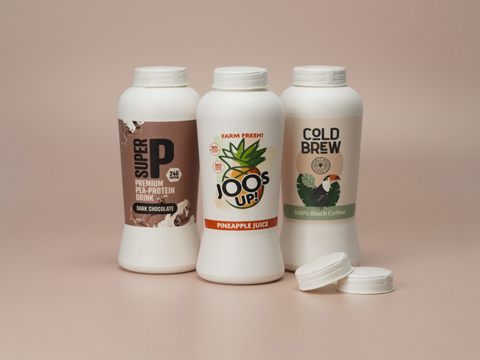
PulPac and PA Consulting are now testing Dry Molded Fiber bottle caps via The Bottle Collective – aiming to help companies reduce their carbon footprints ‘significantly’ and meet consumer demand for environmentally conscious packaging.
Diageo, Logoplaste, Haleon, and Sanofi are among the current members of the Bottle Collective. The initiative plans to bring Dry Molded Fiber bottles to market at scale by 2025.
Apparently, Dry Molded Fiber – a fibre-forming technology in which plant fibres are converted into packaging and products using ‘almost no’ water – is compatible with various caps and closures. It is not thought to compromise the functionality of the pack.
Instead, it is set to help brands align with ‘stringent’ sustainability targets in the worldwide push to tackle plastic waste and achieve circular economies. The Bottle Collective aspires for over over 95% fibre-based content in products, caps and closures included.
“We are thrilled to introduce this new bottle cap as part of our ongoing work with the Bottle Collective,” said Jamie Stone, design, innovation and sustainability expert at PA Consulting. “With our latest innovation in bottle caps, we’re enabling the creation of entire bottles made from Dry Molded Fiber technology, offering a sustainable and scalable alternative to single-use packaging.”
“We are just scratching the surface of this technology’s potential,” Sanna Fager, chief commercial officer at PulPac, continued. “Dry Molded Fiber products can be part of people’s lives in many ways, from a morning coffee on the go, to preparing the family dinner or serving a drink to long-awaited guests. Dry Molded Fiber can enhance these moments with sustainable, high-performing packaging solutions.”
Philip Fawcus, sustainable materials expert at PA Consulting, added: “This bottle cap is not only a milestone in sustainable packaging but also a testament to the versatility and scalability of the Dry Molded Fiber technology. As the demand for sustainable packaging solutions continues to grow, we are proud to partner with PulPac and to remain at the forefront of providing innovative alternatives that meet both environmental and market needs.”
PulPac and PA Consulting emphasize that this development is the first stage in the development of fibre-based caps and closures. An upcoming range will be revealed ‘in the near future’, they say.
In similar news, Blue Ocean Closures is another industry player seeking to reduce plastic consumption and carbon emissions by producing closures made of cellulose fibre. After partnering with Coca-Cola’s Brussels-based EMEA R&D Center to advance the cap’s development and Arla Foods to produce a fibre-based cap for its milk cartons, its screw cap underwent a global launch earlier this year in a partnership with Great Earth.
The Bottle Collective also trialled a paper-based bottle for Baileys’ Original Irish Cream Liqueur at Time Out Festival in Barcelona back in May. Designed for recycling in standard paper streams, it was intended to alleviate consumers’ responsibility to separate the plastic liner from the paper bottle at the point of disposal.
If you liked this story, you might also enjoy:
The ultimate guide to the Packaging and Packaging Waste Regulation in 2024
How are the top brands progressing on packaging sustainability?
Sustainable Innovation Report 2024: Current trends and future priorities
Everything you need to know about global plastic sustainability regulation














No comments yet